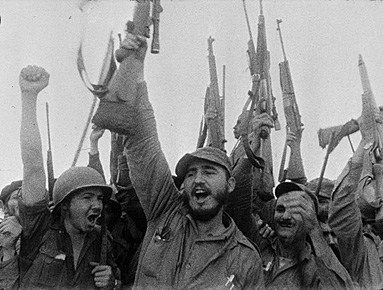
- Articles
Book Review of Cuba in Revolution: Escape From a Lost Paradise. Reviewed by George C. Leef
The vicious regime of Fidel Castro has for more than 40 years trampled on individual rights in Cuba, but the details of his seizure of power and subsequent Stalinist rule remain surprisingly little known in the United States. Within weeks of the September 11 terrorist attacks, everyone was hearing about the atrocities of the Taliban in Afghanistan, but year after year, Castro and his henchmen torture and kill Cubans who seek elemental human freedoms with virtually no attention from the media. Most Americans remain blissfully ignorant.
In his new book, Cuba In Revolution, Dr. Miguel Faria strives mightily to tell the truth about Castro and his government. As a boy of 13, Faria escaped from Cuba with his father, came to the United States, studied medicine, and became a surgeon. In his previous books, he has fought against the trend toward socialist health care in the United States. With this book he takes up what undoubtedly is the source of his greatest passion-the ruin of his homeland by one of the most repressive states in the world.
One part of the book is Faria’s recounting of his escape from Cuba in 1966. “Harrowing” is the best adjective to describe the events-a middle-of-the-night drive with a stranger to whom Faria and his father entrusted their lives; boarding the poorly maintained little fishing boat (it had been confiscated by the government after Castro’s seizure of power, so naturally it was in bad condition) and setting out for the 200-mile voyage to the Cayman Islands; engine trouble; a near-collision with a Soviet freighter in the dark; a severe storm that almost capsized the craft; severe dehydration; and the lucky sighting of the smallest of the Caymans when they were lost and at the point of desperation. It would make a great movie if Hollywood had any interest in stories that show communism as a hellhole worth risking life itself to escape.
Most of the book, however, is devoted to setting the record straight about Castro’s regime. Faria has sharp words for the gullible American media that have chosen to serve as a conduit for Castro’s disinformation. Going back to the reporting of Herbert Matthews of The New York Times in the 1950s, when Castro was organizing his campaign against the Batista regime and continuing up to the present, the media have readily accepted the government’s claims to have made great improvements in literacy and health care for the Cuban people. Castro’s statistics are pure deception, Faria shows.
In health care, for instance, the Cuban government claims to have greatly reduced infant mortality. Faria observes that Castro’s statistics are hardly reliable, but it appears that what little improvement there may be in infant mortality comes at the expense of a worsening of health for older children and mothers. Castro has chosen to focus on the one statistic calculated to tug most at the heartstrings of Americans while allowing the health of the people in general to decline. The author’s mother visited Cuba in 1995 and could see that clinics are dirty and lacking in basic supplies and equipment. Moreover, the diet and hygiene of the population have fallen to Third World levels.
Another piece of Castroite deception that the media fall for is the supposed “safety” of living in a country with complete gun control. One of the first orders of business after taking power in 1959 was the confiscation of private firearms, a task made easier because of the previous gun registration by Batista’s government. When the Elián González battle flared in 2000, Castro sympathizers, in an attempt to capitalize on the shootings at Columbine High School, were heard to say that in Cuba the boy would be able to attend schools that were safe. Faria argues that no one is really safe in totalitarian Cuba, and notes that with gun control, the homicide rate in Cuba is higher than in the United States.
Speaking of the González affair, Faria strongly condemns the Clinton administration’s insistence on returning the child to Cuba. Singled out for particular scorn is Dr. Irwin Redlener, a loyal Democratic supporter of government health-care initiatives, who, without even seeing the child, claimed that he was being held in a “profoundly disturbing and dangerous environment.” That “expert opinion” (given to counteract the opinions of physicians who had actually seen Elián) provided the excuse Janet Reno wanted to justify the infamous pre-dawn raid.
Faria is optimistic that after Castro’s demise, his regime will totter and fall as did those in Eastern Europe. He sees hope in reports that the Internet is starting to spread the truth in Cuba and that several of Castro’s top lieutenants appear to be squirreling away money in foreign accounts.
It’s hard to imagine that anyone could read this book and not feel the deepest sorrow for the Cuban people, who have suffered so much at the hands of Fidel Castro.
Reviewed by George C. Leef
George Leef is the book review editor of Ideas on Liberty. Reprinted from Ideas on Liberty, June 2002.
This article may be cited as: Leef G. Book Review of Cuba in Revolution: Escape From a Lost Paradise. Ideas on Liberty, June 2002. Available from: https://haciendapublishing.com/book-review-of-cuba-in-revolution-escape-from-a-lost-paradise-reviewed-by-george-c-leef